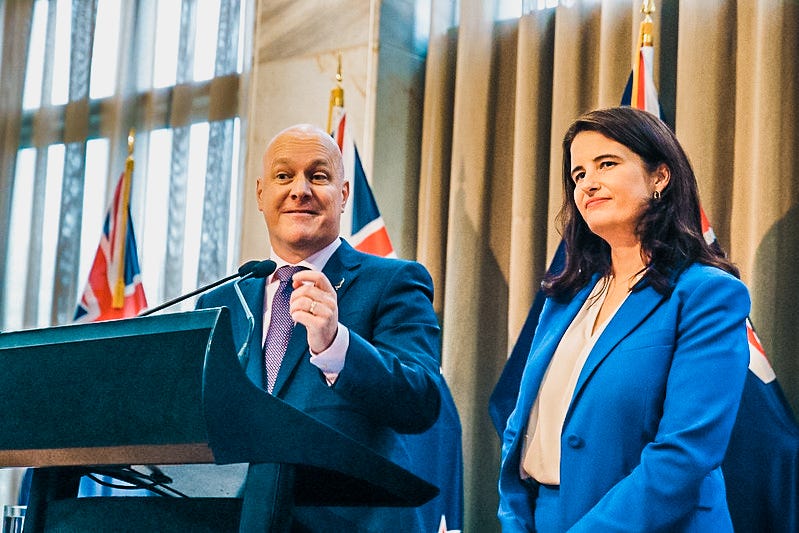TLDR & TLDL: So it turns out new National Leader Christopher Luxon is a regular (property owning) Kiwi bloke after all: he is making more money tax-free from his house than his real job.
Actually, Luxon, a landlord and bach-owner as well as a homeowner, made more in tax-free capital gains from his seven properties in the 11 months of this year than he made in his best year as Air NZ CEO.
Stuff’s Charlie Mitchell and Laura Walters report this morning that Luxon’s two main homes in Auckland, his four rental properties in Auckland and the apartment in Wellington he rents off himself at the taxpayer’s expense, have risen in value by $4.3m to $21.145m so far in 2021. That is more than the $4.2m he earned as Air NZ CEO in 2018/19, when he was the best paid CEO of a listed company in New Zealand.

(See more on this below the paywall fold, and the contrast with his call for more investment in business assets to improve productivity and incomes, which he says is the pathway to housing affordability, given he doesn’t want house prices to fall much. Subscribe in full here to this one-year special to support my accountability and explanatory journalism on housing, climate and child poverty.)
Elsewhere in the news this morning:
global stocks bounced back this morning as investors jumped in to buy what they saw as bargains after yesterday’s rout;
markets digested the Fed’s abandonment of ‘Team Transitory’ and focused instead on snippets of good news emanating from South Africa on the potency of the omicron strain and comments from the European Central Bank that it would keep printing and pumping liquidity into global asset prices;
the European Central Bank said still saw inflation as transitory and would keep creating cash and buying bonds off banks, fund managers and wealthy savers a rate of €80b a month;
The German 10 year bund was solid at -0.35%, meaning the real yield is running at around -6.3% because of 6.0% inflation in Germany, and there is still strong demand because the savings glut is held by holder risk-averse wealth people;
Turkey’s central bank intervened overnight to buy the Turkish lira, breaking a previous promise not to buy the local currency, which has collapsed 47% this year because of interest rate cuts global investors see as politically driven;
the lira bounced 8% after President Tayyip Erdogan said the central bank had intervened “due to unhealthy price formations in exchange rates,” so one NZ dollar buys 9.04 lira this morning, up from 5.86 as recently as August 21 at the start of our lockdown;
the OECD forecast global GDP growth of 5.6% this year before a moderation to 4.5% in 2022 and 3.2% in 2023;
the growth forecast was little changed from the OECD’s last outlook, but it raised its global inflation forecast for next year to 4.4% from 3.9%;
however, OECD Chief Economist Laurence Boone said central bankers should hold their rate hikes to wait for inflation to ease: “In current circumstances, the best thing central banks can do is to wait for supply tensions to diminish and signal they will act if necessary,” Boone said overnight;
South African authorities reported overnight initial signs were the omicron variant was more infectious, but that cases were mild, although hospitalisations had increased;
In other Covid news, the European Union called on its members to consider copying Austria’s decision to make vaccination compulsory for all eligible citizens: "It is understandable and appropriate to lead this discussion now - how we can encourage and potentially think about mandatory vaccination within the European Union,” European Commission President Ursula von der Leyen said overnight; and,
Mayor Phil Goff proposed Auckland Council’s Annual Budget for 2022/23 include $1b of spending on climate change initiatives over 10 years, funded by a 2.5% Climate Action Targeted Rate on top of 3.5% regular rate increase, rather than use Auckland Council’s balance sheet and AA credit rating to smooth the infrastructure costs over decades.
Coming up later today, I’ll be looking out for the report due back from the Select Committee considering the Resource Management (Enabling Housing Supply and Other Matters) Amendment Bill, which is the result of the bipartisan ‘Townhouse Nation’ accord allowing three three-storey houses up to 12m high on a regular section without the need for a resource consent. Luxon suggested this week National may agree to changes proposed by opponents worried about ‘slums’ and councils not wanting to provide infrastructure.
Listen to this episode with a 7-day free trial
Subscribe to The Kākā by Bernard Hickey to listen to this post and get 7 days of free access to the full post archives.















